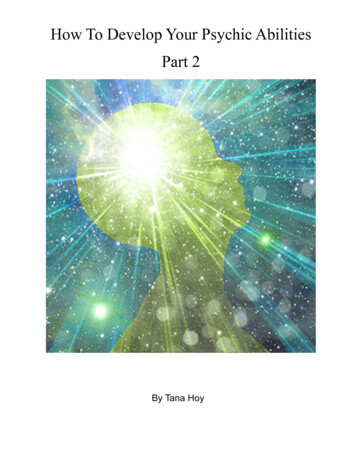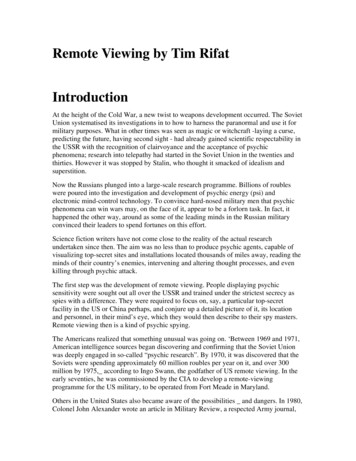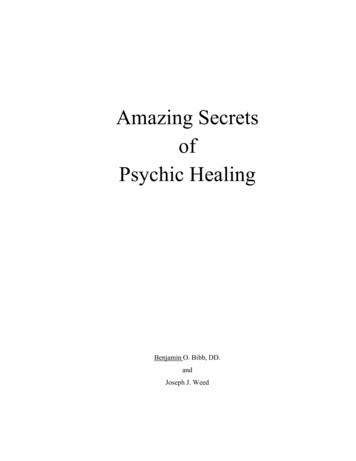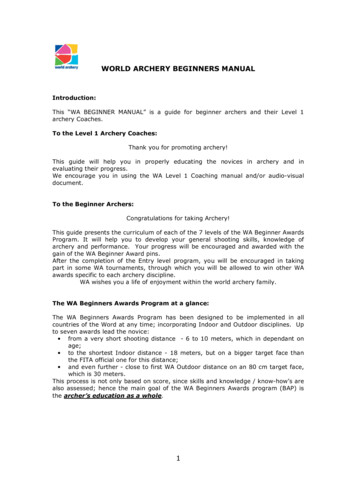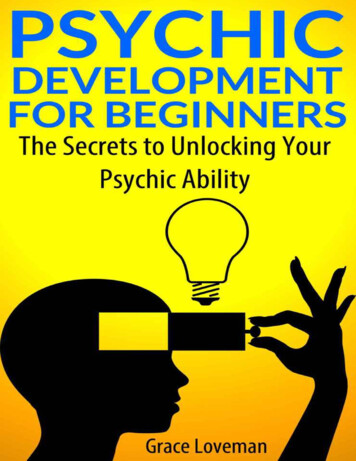
Transcription
Psychic Development for BeginnersThe Secrets to Unlocking YourPsychic AbilityBy Grace Loveman
Thank you for your interest.As a thank you, I’d love to offer you a free bonus report that will help youeven more in terms of your personal development and well-being. You canaccess the bonus by clicking on the image below.And you’ll be able to find one additional bonus at the end of the book too!
Why You Should Read This BookWe’ve all heard about psychic mediums and palm readers before. You mayhave even gone to one yourself. What you may not know, however, is thatwe all possess psychic abilities deep within ourselves. Some people’sabilities come more naturally than others. But with a little practice andpatience, each and every one of us possesses the capacity to make ourintuition and psychic abilities stronger and more powerful.Psychic abilities do not just entail things like predicting the future andcommunicating with entities from another realm – those things can be a partof our psychic development, for sure. But in a more day-to-day sense,psychic abilities can help us to become more in touch with our higherselves, which in turn can help us to do things like Abate stress and anxiety levelsFeel more creativeIncrease our ability to concentrateMake better decisionsLive in the present momentEtc.So if you’d like to experience any of all of these things in your own life,then you have come to the right place. This book will enlighten you aboutall of these things and so much more. You will also learn about the historyof psychic development, along with many useful exercises, which you canpractice on your own, to help you hone and refine your innate skills.Overall, this book will enable you to become a more relaxed, connected,and mind-enriched being.
Table of ContentsThank you for your interest.Why You Should Read This BookTable of ContentsIntroductionChapter 1: A Little Bit of HistoryParapsychology – What Is It?Ancient Greece and the Oracle at DelphiThe Mysteries of Ancient EgyptParapsychology in the BibleChapter 2: Key Terms to KnowWords and Phrases You Should KnowChapter 3: The A, B, C’s of Developing Successful IntuitionThe Importance of Intuition ImprovementHoning Your Intuition SkillsExercises to Help Develop Your IntuitionWhat’s Your Intuition Type?Chapter 4: The Signs of the ZodiacHey Baby, What’s Your Sign?Splish, Splash: The Water SignsLook Up to the Sky: The Air SignsGrounded: The Earth SignsUsing the Signs of the Zodiac to Your AdvantageChapter 5: Altered States of MindStates of Consciousness: Reflective, Non-Reflective, and AlteredBest Ways to Achieve an Altered State of Consciousness
Chapter 6: How to Enhance Your First Five SensesThe First Five SensesExercises to Strengthen Your SensesChapter 7: Essential Training to Achieve Your Primary Psychic LevelThe Configuration of Your PsycheAre You Thinking What I’m Thinking?Only in Dreams Learn How to Have Precognitive DreamsChapter 8: Psychic Shields What You Need to DoProtect Yourself with a Psychic ShieldChapter 9: Everything You Need to Know about Successful Energy ManipulationEnergy Manipulation 101Basic Energy Manipulation TechniquesIntermediate Energy Manipulation TechniquesAdvanced Energy Manipulation TechniquesAll-Star Energy Manipulation TechniquesChapter 10: Psychic Master Minds and Your Own Psychic GoalsDefine Your GoalsGreat Psychic Minds You Can Learn from TodayJohn Edward – Psychic MediumDr. Doreen Virtue – Clairvoyant MetaphysicianGeorge Anderson – Psychic MediumElizabeth Baron - Trance Medium, Psychic, Ghost BusterChapter 11: Don’t Hinder Your Psychic Development with FearThe Origins of Fear and AnxietyDon’t Let Fear Decelerate Your Development: Learn How to Dissolve ItConclusionBonus!
Review Request Page
Introduction
“Nowadays even presidents, vice-presidents, and heads of big agencies areopening their minds to accept psychic phenomena, because they know itworks.” Uri Geller
Are psychic abilities really possible? Why do some people have an unwavering belief in theirveracity while others scoff at the very hint of their existence? Well, before we get into all of that,since you are reading this book, I assume it’s safe to say that you at least somewhat believe in thepotential of psychic abilities, even if you are not entirely convinced yet.With that said, I feel the need to disclose that I am not one of the world’sgreat psychics. I cannot even hold a candle to the likes of John Edward,Elizabeth Baron, or Dr. Doreen Virtue, whom you may have seen ontelevision or read about in a magazine or newspaper. I am just an ordinaryperson with an interest in psychic development, who has taken the time toeducate myself about honing my innate psychic abilities. And now, throughthis book, I am going to impart the wisdom I have gained onto you.My interest in psychic development started when I was just a kid. When Iwas around nine or ten years old, I read the book Matilda by Roald Dahland became obsessed with the idea of learning how to move objects withmy mind.For those of you who don’t know, Matilda is the exceedingly charmingstory of a precocious yet neglected young girl who learns to harness hertelekinetic powers and use them to help free herself from the cruelty in herlife, namely her parents and the vicious principle of her school, aka theTrunchbull.In a nutshell, the book is fantastic, and even though it’s meant for fourthgraders (just pretend you’re buying it for your kid *wink wink*), youshould definitely go ahead and read it if you haven’t already done so.I have wonderful parents and my teachers were all really nice to me, buteven still, after reading Matilda, I used to try to mimic her amazing powers.Instead of eating my vegetables, I would stare intensely at them, trying towill them to whiz around the room just like Matilda had done. This maysound a little strange, but let’s be honest; most 9-year olds will go to somepretty extreme lengths to get out of eating their veggies, so why not tryingto make them fly south for the winter?Needless to say, my legume staring contests were incredibly anti-climatic.Yep, every last one of those beady little broccoli florets just sat there on myplate staring back at me, defiantly unresponsive to the power of my mental
faculties. But for me, that’s where it all started – with an avid interest, somehearty determination, and a strong dislike of leafy greens.If you are on the fence about the realness of psychic abilities, I am notgoing to try to force you into becoming a believer, even though through mypersonal experiences, I could not go through life any other way. But as Isaid before, the choice to believe or not to believe is entirely up to you.My goal is simply to pass on what I think is very valuable informationabout the history of psychic development along with all of its current shapesand forms and to walk you through a series of mental exercises that canpermit you to tap into your own innate psychic ability if you so choose.You do not need to possess any special gifts or have a superior intellect inorder to develop psychic abilities. The only thing you really need to have isan open mind. So now, before you progress any further, please ask yourself,“Do I have an open mind? Do I think it’s possible for me to develop myown innate psychic ability?” If you responded negatively to these questions,then you should probably stop reading this book immediately. However, ifyour responses were both “Yes,” then you are well on your way.In fact, you actually may have already tapped into your innate psychicability without even knowing it! Have you ever received a phone call andjust known who was on the other end before you even picked up thereceiver? (And no, looking at the Caller ID does NOT count.) Or, have youever had a feeling in your gut, telling you either to do or not to dosomething that was a little out of the norm and then later found out thatlistening to this mysterious feeling was highly advantageous?For example, let’s say that every morning you take route A to work, but forsome strange reason, your gut tells you to take route B, even though it isslower and more out of the way. Then, you come to find out there was ahuge accident (that you could have been involved in) on your usual workroute that particular morning.The odds are that you have experienced something similar to what I justdescribed at one point or another over the course of your life. Or perhapsyou have had an experience of either doing or seeing something before,even though you knew this was not the case – a relatively commonphenomena known as déjà vu (already seen).
All of these instances are basic forms of psychic, or sixth sense,experiences, and in this book, I am going to show you how to build uponthese types of occurrences so that you can harness your ability to do thingsyou may have never thought possible.
Chapter 1: A Little Bit of History
Before we get into the good stuff, I thought it would be a good idea to lay-out a little bit of thegroundwork surrounding the history of psychic development so you can see that the fascination withthis topic is by no means a recent occurrence.If history isn’t your cup of tea, however, then don’t worry; I won’t beoffended if you skip ahead - even though examining what came before andunderstanding why and how certain events occurred is crucially importantto the functioning of our society just sayin’.At any rate, here’s a tasty slice of psychic history pie to sink your teethinto
Parapsychology – What Is It?The term ‘parapsychology’ is derived from two words: the Greek word‘para,’ meaning ‘beyond’ or ‘alongside,’ and ‘psychology,’ the science ofbehavior and the mind. Parapsychology refers to the study of the manyforms of psychic and paranormal phenomena, which includes precognition,telepathy, psychokinesis, clairvoyance, reincarnation, near-deathexperiences, and apparitional appearances.Parapsychology is a relatively new field of study; the term having beencoined around 1889 by a philosopher named Max Dessoir. It was adoptedsome 40 years later by J.B. Rhine as a proxy for the term ‘psychicalresearch.’ Parapsychology proponents regard the field as an “embryoscience.” Its critics, however, argue that parapsychology is nothing morethan a pseudoscience, as no conclusive evidence has been found, and anyexperimental successes can be chalked up to methodological flaws.However, Nobel Laureate, Brian David Josephson, counters this criticismby deeming parapsychology as having been unfairly judged due to thechallenge of “putting these phenomena into our present system of theuniverse.”In 1882, the Society of Psychical Research (SPR) was founded in London.It served as the premier systematic effort of organizing scholarly minds fora prolonged, scientific investigation of psychic and paranormal phenomena.The SPR was attended by philosophers, scientists, scholars, and politicians,including notable names such as Arthur Balfour, William Crookes, andHenry Sidgwick. At the SPR, subject studies were classified into thefollowing categories: hypnotism, telepathy, Reichenbach’s phenomena,apparitions, haunts, and materialization.The Census of Hallucinations was one of the SPR’s first collaborativeefforts. It presented findings from sane people who had experiencedhallucinations and apparitional experiences. In 1886, the results werepublished into a work called Phantasms of the Living, which continues toserve as a reference for today’s parapsychological literature.
During the era of J.B. Rhine, Stanford University became the first academicinstitution in the United States to study extrasensory perception, a.k.a. ESP,along with psychokinesis. Duke University then followed in Stanford’sfootsteps some 19 years later in 1930 to become the second U.S. institutionof higher learning to study ESP in a laboratory setting.Studies were conducted by J.B. Rhine and colleagues, using cards and dice,in an effort to take a quantitative, statistical approach to test the existence ofESP. Rhine had subjects guess which symbol, out of five possible choices,would occur when flipping through a deck of specially-made cards. Aftergoing through over 90,000 trials, Rhine found that ESP was “an actual anddemonstrable occurrence,” which he stated in his book ExtraSensoryPerception (1934).Rhine’s book was met with significant criticism, with critics claiming thatsubjects were finding ways to cheat and that Rhine was using selectivereporting, meaning that test scores of subjects whom Rhine felt wereintentionally guessing incorrectly were not reported.However, in spite of Duke University’s decision to sever parapsychologicallinks after Rhine’s retirement in 1965, Rhine went on to establish theFoundation for Research on the Nature of Man (FRNM), which was laterrenamed the Rhine Research Center.Today, the aim of the research center is “to improve the human condition bycreating a scientific understanding of those abilities and sensitivities thattranscend the ordinary limits of space and time.”Another one of J.B. Rhine’s contributions to the field of parapsychologyoccurred in 1957 with the creation of the Parapsychological Association(PA). The mission statement of the PA is “to advance the field ofparapsychology as a science, to disseminate knowledge of the field, and tointegrate the findings with those of other branches of science.”Renowned anthropologist Margaret Meade also became involved with thePA, and in 1969, the PA became affiliated with the American Associationfor the Advancement of Science (AAAS), which is the world’s largestgeneral scientific society.
The PA’s association with the AAAS led to a huge increase inparapsychological research. During this time, many new organizations wereformed, including the Academy of Parapsychology and Medicine, theAcademy of Religion and Psychical Research, the Institute of Parascience,and the Princeton Engineering Anomalies Research Laboratory. The rise inresearch continued into the 1980’s, with the PA reporting to have membersworking in over 30 different countries.In more recent years, however, the amount of parapsychological researchhas diminished considerably in the United States, as early research wasdeemed inconclusive. On the other hand (or, on the other side of theAtlantic, as the case may be), European parapsychological research hasmaintained its active involvement, with the largest number of activeparapsychologists residing in the United Kingdom.Furthermore, parapsychological research has been substantiated by severalpsychological sub-disciplines, including transpersonal psychology, whichexamines the spiritual components of the human mind, and anomalisticpsychology, which takes a psychological approach to studying paranormalbeliefs.As you can see, active involvement in the field of parapsychology haswaxed and waned over the years, but this is clearly due to the fact thatparanormal and psychic activities are not occurrences that can easily bestudied and tested according to traditional scientific means. And in spite ofinconclusive evidence, given the number of associations and researchfacilities, it is clear that parapsychology is a field of study that is alwaysgoing to be of significant interest.While parapsychology is a relatively new field of scientific research,paranormal and psychic happenings have been occurring since ancienttimes.
Ancient Greece and the Oracle at DelphiThe Oracle of Delphi is one of the most important relics of ancient Greece.Enormous contributions to the functioning of the entire ancient civilizationwere arrived at based on consultations with the Oracle. Political decisionswere made according to the Oracle’s influence, and no Mediterraneancolony was founded without the Oracle’s consent.Archeological findings indicate that the importance of the Oracle dates backto the Mycenaean Period (1600-1100 B.C.), with it reaching its pinnacleduring the 6th century B.C. Over the centuries the presiding of the Oraclespread to include functions like cultural events, athletic games, and Delphicfestivals, such as the Pythian Games, held every four years to honor theslaying of the Python Dragon by the sun god, Apollo.During the 8th century B.C., the Oracle at Delphi gained internationalrecognition for the powers of its priestess, known as the Pythia, who wouldsit on a tripod, inhaling light hydrocarbon gasses, as she mutteredincomprehensible prophecies after falling into a deep and frequently violenttrance.Mere mortals could not understand the prophecies on their own, since it wassaid that during the Pythia’s trance-like state, her spirit was possessed byApollo himself. Therefore, Delphic priests would have to interpret thePythia’s words into common language.Such faith was placed on the Pythia’s telling of the future that no majordecisions were made without consulting her first. Dignitaries, heads ofstate, and common folk alike would make frequent pilgrimages to see thePythia, and they would pay large amounts of money for her oracles.The Oracle at Delphi continued to prosper until the 1st century B.C. Atwhich time it suffered significant damages due to earthquakes, looting, andbarbarian invasions. Soon thereafter, the surrounding area became highlyimpoverished. The Oracle persevered, however, until 395 A.D.; the year itwas finally closed by emperor Theodosius.Today, many people hypothesize that the Pythia’s predictions and trancelike states were induced by the inhalation of gasses, emanating from
geological chasms in the earth. It is believed that these gasses may have hadhallucinogenic properties. While this conclusion may hold some veracity, itstill does not account for how the Pythia was able to make predictions thatinexorably came to fruition.The theme of unavoidable fate or destiny is one that prevailed throughoutGreek literature and lore. The most famous of which is the story ofOedipus, who was told by the Oracle at Delphi that he would murder hisfather and marry his mother, a fate that he desperately tried to avoid. But, asOedipus should have known, you cannot escape your fate.There are many other oracular stories like the tale of Oedipus which stemfrom ancient Greece. However, if you are looking for the richest source ofarcane and supernatural lore, then you need to move a little further south to the Valley of the Nile in ancient Egypt.
The Mysteries of Ancient EgyptAncient Egypt is a highly researched and studied civilization, yet so muchof it is shrouded in mystery - a fact which is likely due to the society’swealth of paranormal activity and magical beliefs. Like the Greeks, ancientEgyptians consulted oracles to obtain knowledge and guidance from thegods. The enigmas of ancient Egypt, however, extend much deeper than justoracular consultations.Ancient Egyptians had a strong belief in Heka, which is translated to mean‘magic,’ or “the ability to make things happen by indirect means,” asEgyptologist James P. Allen puts it. It was believed that Heka was anaturally occurring phenomena - one that was used to create the universe aswell as what the gods used to implement their will. Although, the use ofHeka was not restricted to the gods or dignitaries or high priests;commonplace people were also welcome to use it for personal reasons.The use of Heka involved the activation of a person’s soul, or their Ka,which is how ancient Egyptians believed magic worked. Through the Ka’sactivation, ancient Egyptians thought they would be able to influence thegods and gain protection.For ancient Egyptians, the Ka was very complex. It was comprised of themortal body and eight additional semi-divine components, all of whichsurvived after death.Below, you will find information about the deconstruction of the Egyptiansoul, or being:Khat or Kha: This represents a person’s physical body, which would decayafter death and could only be preserved through mummification.Ka: This is what was considered to be a person’s ‘double,’ also referred toas an ‘astral projection.’ After death, the Ka would linger on inside thetomb, inhabiting either the person’s body or in some cases, a statue of thedeceased. The Ka was regarded as being independent, however, so it couldfreely move around. There was a duality that existed within the Ka, with itconsisting of a higher, guardian angel-like Ka, and a lower Ka, whichresulted from knowledge that had been ascertained on earth.
Ba: A bird with a human bird that by day would reside in the tomb, bringingnourishment to the deceased, and by night would travel with Ra, theEgyptian sun god.Khaibit: This was viewed to be the shadow of the deceased. The Khaibit issimilar to the Ka in that it could detach itself from the body of the deceasedand move around at will.Akhu or Ikhu: This was considered the immortal part of the deceased – thepart that would live on in the Afterlife. The Akhu would come into beingafter the deceased passed judgment and the Ka had been united with the Ba.Sahu: Containing all of the mental faculties of a living person, this was aperson’s spiritual body that would be able to reside in the heavens afterjudgment was successfully passed.Sekhem: This was considered to be the ethereal personification of thedeceased’s life force.Yb or Ab: This was a person’s heart, or their moral compass, telling themright from wrong. After death, the Yb could either leave the body and residewith the gods, or if the deceased did not pass judgment, then the Yb wouldbe eaten by Ammut, the Egyptian goddess of divine retribution.Ren: A vital component of a person’s journey from life to death, the Renwas a person’s true name. It was considered to have magical qualities thatcould bring about a person’s downfall if their name was destroyed.While the days of ancient Egypt are long gone, their presence and influenceare still very apparent in the modern world. For example, the GizaNecropolis and the Great Pyramid of Giza - no one knows how they werebuilt exactly, yet they are two of the most revered man-made structuresstanding today.Many hypotheses have been made about the construction of the Pyramids.Yet most modern archeologists believe they were built by tens of thousandsof skilled workers over the course of more than 20 years. It is speculatedthat copper chisels were used to carve the huge stones, which were thenhauled into place using a complex system of ramps and levering methods.
While this hypothesis has a lot of credibility, it does not possess nearlyenough concrete evidence to put the pyramid construction debate to restwithout leaving any lingering doubts. For one, the building techniques havenever been able to be replicated and two, the archeological findings thathave been made are insufficient to fully prove any one theory.If the Great Pyramid of Giza was built over a period of around 20 years,consisting of more than 2 million massive blocks of stone, each weighingapproximately 2 and a half tons, then that would mean that a block wouldhave had to have been set in place every three minutes. Even if each of theworkers was the size of the Hulk, subsisting entirely on a diet of spinach ala Popeye, this incredibly work-pace would still seem highly improbable.The debate concerning the construction of the pyramids has been going onfor so long that some people have actually come to the conclusion that itwould have been impossible for the ancient Egyptians to have built thepyramids by themselves, given the primitiveness of their society. So as aresult, the pyramids must have been built by aliens.The alien theory is a highly unlikely one, however, as there is indisputable,archeological evidence proving that the pyramids were man-made.Although, given the mysticism surrounding ancient Egypt, it has beenspeculated that levitation could have been used to build the pyramids.In the 10th century, an Arab historian by the name of Masoudi scribed thatthe ancient Egyptians used magic spells to move the large stones. Masoudi’sstory was even cited in science and history writer Andrew Collins’ Gods ofEden: Egypt’s Lost Legacy and the Genesis of Civilization.According to Masoudi’s account, the stone’s were placed on top of leaves ofpapyrus, or paper that had been inscribed with special characters. Then, thebuilders struck the stones with a special rod, which caused the stones tomove the distance of a bowshot (a little more than 200 feet).In his book, Collins insists that “the ancient Egyptians were able to set upsome kind of sustained sound vibration that enabled the building blocks todefy gravity.” And while it can be argued that Masoudi’s account is nothingmore than just a legend, there are tales from all over the world thatsubstantiate it, as they also recount instances of stone blocks being movedand buildings being constructed by way of sonic levitation.
Besides using levitation or other psychic forces to actually create thepyramids, there is also evidence that psychic happenings occurred inside thepyramid’s walls. It is believed by some that a hidden astronomical codeexists, which supposedly contains prophetic information concerning eventsthat may bring about the end of our civilization.Through the conversion of the dimensions of the chambers andpassageways of the Great Pyramid, there appears to be correlations forsome of the earth’s most significant events, including the birth, baptism, andcrucifixion of Jesus, the start of the Industrial Age, and World War II. Thehuge downside to this timeline is that no matter how it is interpreted, itindicates that the 20th century marks the beginning of mankind’s final phase.Well, that’s a rather dreary note on which to leave ancient Egypt, but nowlet’s move on to discussing parapsychological occurrences in the mostwidely read book in the world, and no, I don’t mean The DaVinci Code; I’mreferring to the Bible, of course.
Parapsychology in the BibleIf you are a subscriber to the Judeo-Christian faith, then you have probablynever thought of the Bible in parapsychological terms before, and that isentirely understandable. However, if you take another gander at the Biblewith a different frame of mind, you can see how the occurrence ofnumerous psychic happenings could be argued.For starters, take the Prophet Isaiah from the Old Testament. Prophecies arepredictions of the future; thus, from a psychic standpoint, it could be arguedthat through his prophecies, Isaiah was tapping into his innate psychicabilities.Of course, if you are a believer of one of the Biblical faiths, then perceivingIsaiah as a psychic isn’t a notion that is likely to sit well with your stomach.However, before the B word (B is for blasphemy) starts getting thrownaround, please allow me to first clarify that I’m not making anyconfirmations either way as to whether Isaiah was or was not a psychic.All I’m meaning to do is pose an alternate interpretation of the information,which you can take or leave; it’s just some food for thought, and if it tasteslike blasphemy sauce, then simply spit it out.With that said, the Prophet Isaiah made numerous predictions about thefuture, many of which came to pass; for example, Babylon beingoverthrown by the Medes and reduced to swampland.Joseph, son of Rachel and Israel, is another important Biblical figure whoexperienced dreams that accurately predicted the future. Joseph was theeleventh of Jacob’s twelve sons, and his father greatly favored him over hisbrothers. This favoritism caused Joseph’s brothers to grow incrediblyjealous of him - a jealousy that become greatly exacerbated once Josephrevealed a dream he had, during which it was foretold that he would ruleover all of them.Joseph’s foretelling did in fact come to pass. After his brothers sold himinto slavery due to their envy and resentment, Joseph was able to rise up inthe ranks, gaining favor with the Pharaoh through his ability to accuratelyinterpret the Pharaoh’s dreams.
One of the most important dreams that Joseph interpreted concerned aperiod of seven plentiful years of crops followed by seven years of famine.Joseph’s predictions helped the Egyptians make the necessary arrangementsto endure the famine; plus, Joseph was launched into a position of power,second only to the Pharaoh, thus fulfilling Joseph’s first prophecy.There are numerous other prophetic accounts peppered throughout the Bibleas well as several additional types of occurrences which could be explainedaccording to psychic means, such as clairvoyance, glossolalia (speaking intongues), and paranormal healing.Once again, no toes are meant to be stepped on in this book, so if there issomething mentioned that goes against your personal belief system, simplydisregard it. As I said before, it is not my intention to force you to believe inany of this. My goal is merely to impart the knowledge I have gained ontoyou, and from there, you are free to either use it or file it away in yourmental recycle bin.With that said, at the very least you can now see that the fascination withpsychic development is one that has pervaded throughout the course ofhistory and it is not one that is likely to fall by the wayside any time soon.The interest in paranormal and psychic abilities is not a passing fad like petrocks or shoulder pads; it’s a field of study with a strong historicalfoundation that has captivated millions.
Chapter 2: Key Terms to Know
Ok, so now that we’ve gotten the history lesson out of the way, I think it’s important to go over thedefinitions of some of the key words and phrases that are involved with psychic development. Iknow, I know – you’re thinking this sounds like more homework. First, you had to have a historylesson, now you have learn definitions. Seriously, when’s recess?I can assure you, however, that I would not be including this section if Ididn’t think it was truly important. After all, before you can walk the walk,you have to learn how to talk the talk. Think about it, before doctors canstart practicing medicine, they have to learn the language of it fir
Psychic Development for Beginners The Secrets to Unlocking Your Psychic Ability By Grace Loveman. Thank you for your interest. As a thank you, I’d love to offer you a free bonus report that will help you even more in t
